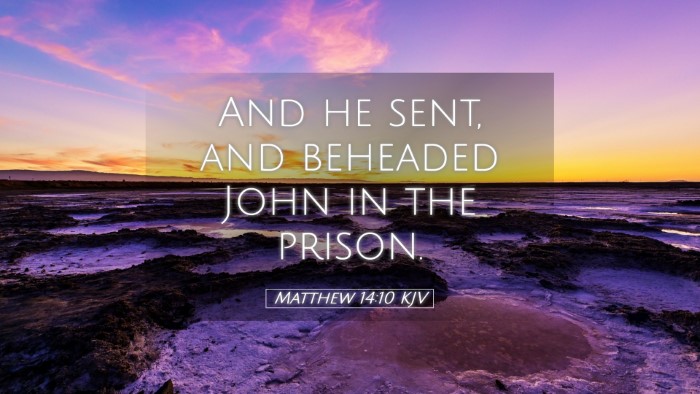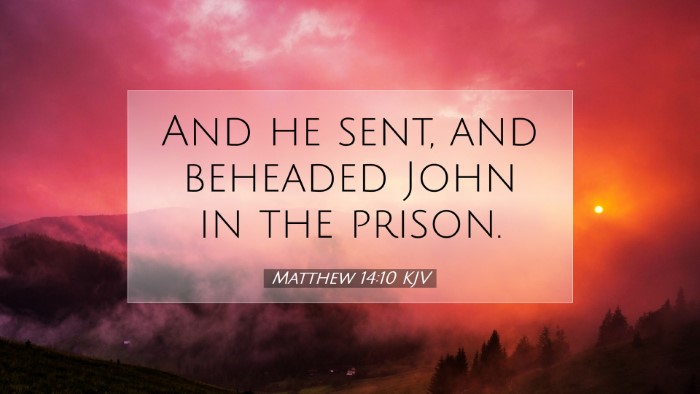Commentary on Matthew 14:10
Matthew 14:10 states: “And he sent and beheaded John in the prison.”
Introduction
The verse cited signifies a pivotal moment in the narrative of the New Testament, particularly in the life of John the Baptist and the unfolding ministry of Jesus. This verse encapsulates the culmination of John the Baptist's prophetic mission and the consequential judgment against him. The tragic death of John the Baptist serves as a powerful illustration of the conflicts between the Kingdom of God and the reign of earthly powers. This commentary synthesizes insights from esteemed public domain theologians like Matthew Henry, Albert Barnes, and Adam Clarke, offering a robust exploration of the theological implications and historical context of this moment.
Historical Context
To fully grasp the implications of John the Baptist's beheading, one must understand the socio-political milieu of 1st-century Judea. The ruling authority, Herod Antipas, had arrested John due to his outspoken condemnation of Herod's marriage to Herodias, the wife of his brother Philip. The tension between monarchy and prophetic truth is palpable in this narrative.
Matthew Henry remarks on the audacity of John in challenging Herod's immoral actions, highlighting his role as a prophet who stood firm against sin, regardless of the cost. Henry emphasizes that John’s commitment to truth ultimately led to his demise.
The Descent into Darkness
As we reflect on the act of beheading, it is imperative to acknowledge the depths of moral degeneration in Herod’s court. Albert Barnes provides insight into how the decision to execute John was influenced not only by Herodias’s malice but also by Herod's own weakness and fear of public opinion.
Herod’s desire to protect his reputation ran counter to his acknowledgment of John’s righteousness, as he was fearful that killing John would have severe repercussions among the people, who regarded John as a prophet (Matthew 14:5). Barnes eloquently explains how this illustrates the turbulent tension that often exists between following one’s conscience and yielding to external pressures.
The Role of Divine Providence
In the tragedy of John’s fate, Adam Clarke highlights an essential theological theme: the sovereignty of God even amid moral chaos. Clarke argues that God’s purposes are sometimes realized through human wickedness. John’s martyrdom, though dreadful, served to fulfill God’s divine plan and purpose in the salvation history through Jesus Christ.
The act of beheading, while senseless from a human perspective, plays a role in the greater narrative of redemption. Clarke asserts that John, as a forerunner and martyr, paved the way for the greater revelation of God through Christ, illustrating that even in death, his prophetic mission was not in vain.
Theological Reflections
This poignant moment invites us to engage deeply with several theological themes:
- Moral Conviction: John’s unwavering stance against Herod demonstrates the necessity of moral courage in the face of tyranny. Pastors and spiritual leaders are called to confront immorality and injustice, drawing from John's example of faithfulness.
- The Cost of Discipleship: John’s fate serves as a sobering reminder that following Christ may lead to suffering and persecution. This requires a deeper discipleship that is willing to embrace inconvenience for the sake of the Gospel.
- Divine Justice: While the world often witnesses injustice, the ultimate accountability lies with God. Barnes reminds us that earthly powers may execute judgment upon the faithful, but divine justice will prevail in the eternal narrative.
- God's Sovereignty: Clarke’s elucidation on God’s providential care assures readers that despite the chaos of earthly rulers, God’s plans are carried forth sovereignly, underpinning trust in His ultimate authority.
Conclusion
Matthew 14:10 serves as a poignant reminder of the complexities of faithfulness in the face of earthly power. The execution of John the Baptist is not merely a historical event but carries profound implications for understanding the nature of discipleship, the reality of persecution, and the ongoing tension between the Kingdom of Heaven and earthly authorities. The texts from Matthew Henry, Albert Barnes, and Adam Clarke shed light on these crucial themes, providing a robust framework for pastors, students, and theologians to draw from as they navigate similar challenges in their own contexts.
In reflecting on this passage, we are invited to renew our commitment to live with conviction, to stand firm in our faith despite the challenges, and to trust in the divine sovereignty that shapes the unfolding story of redemption.


